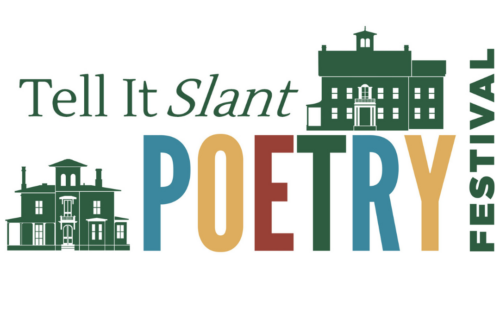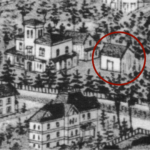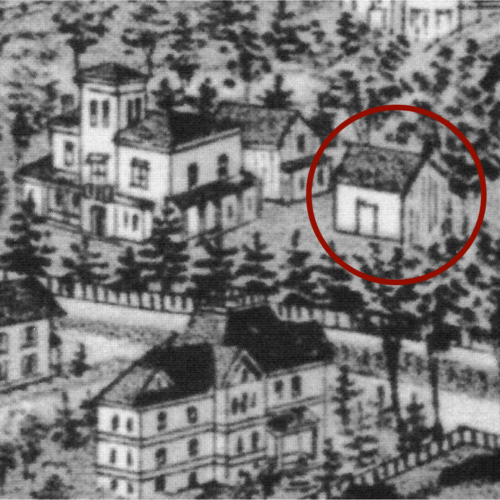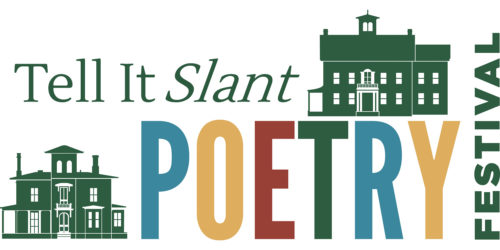
That’s a wrap on 2024 Tell It Slant Poetry Festival, we hope to see you next year. Sign-up for our e-newsletter to be the first to know!
The Tell It Slant Poetry Festival returns September 15-21!
Join us for a week of events happening both online and in-person at the Museum.
The Emily Dickinson Museum’s annual Tell It Slant Poetry Festival is an event with international reach that celebrates Emily Dickinson’s poetic legacy and the contemporary creativity she and her work continues to inspire from the place she called home.
This year’s FREE and hybrid Festival includes events happening online, as well as in-person at the Museum under our heated tent.
This year’s line-up features a talented group of poets from around the country including readings by National Book Award and MacArthur Genius grantee Terrance Hayes, generative writing workshops, poetry panels, an open mic, and more. The cornerstone of the Festival, the Emily Dickinson Poetry Marathon, is an epic reading of all 1,789 of Emily Dickinson’s poems across the Festival week. Learn more about the 2025 lineup below.
REGISTRATION TBA
THE SCHEDULE:
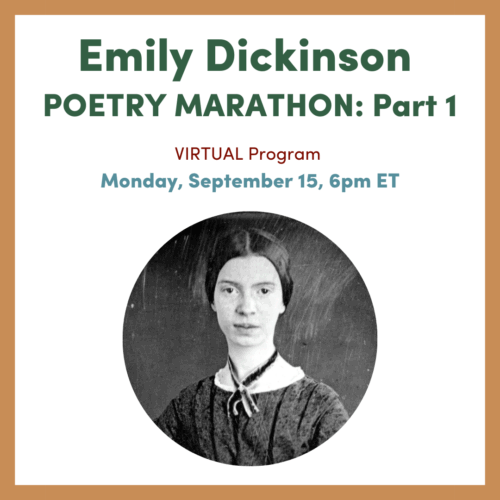
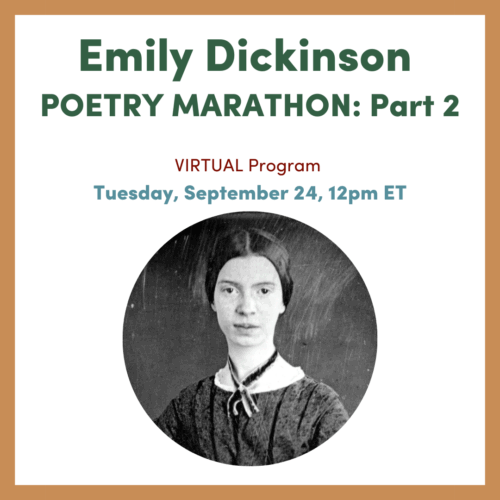
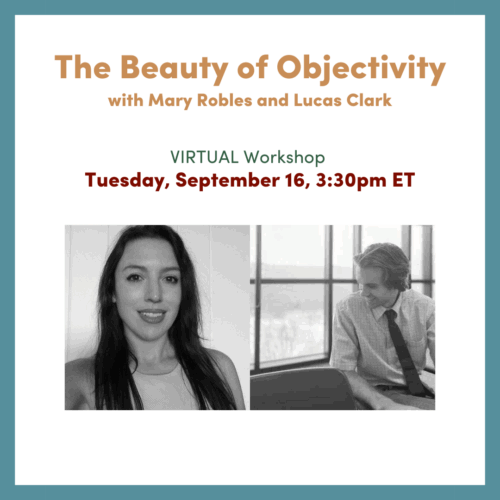
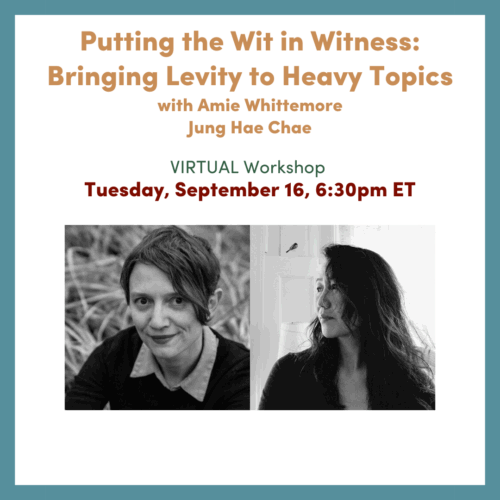
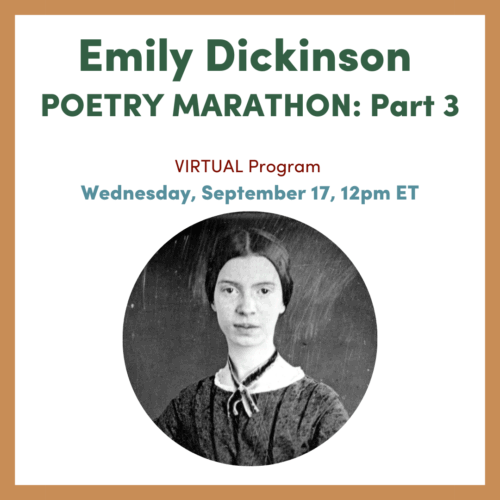
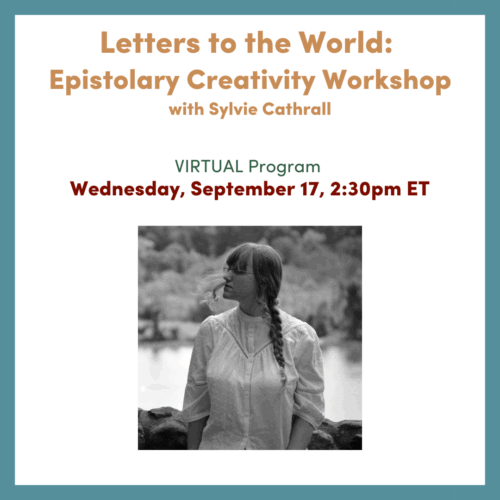
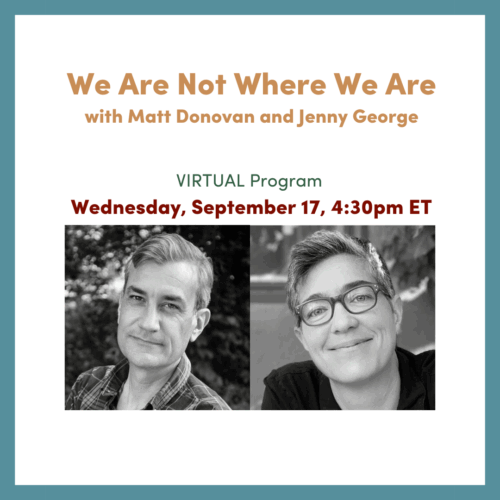
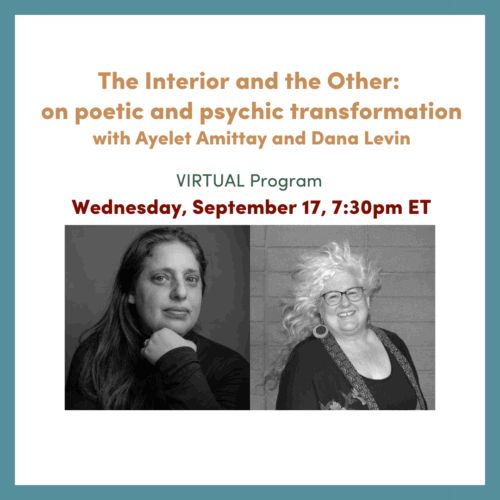
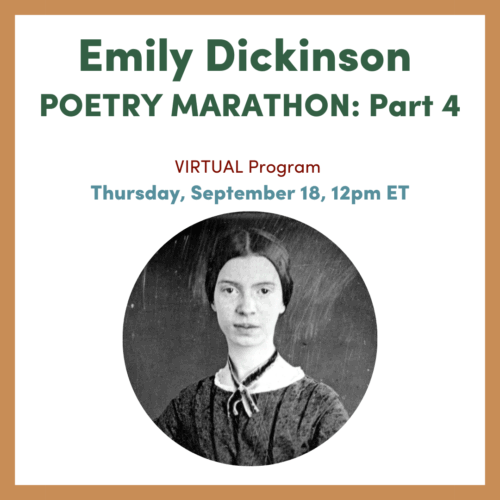
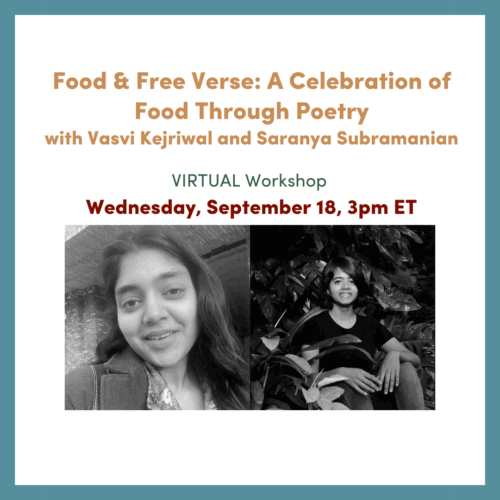
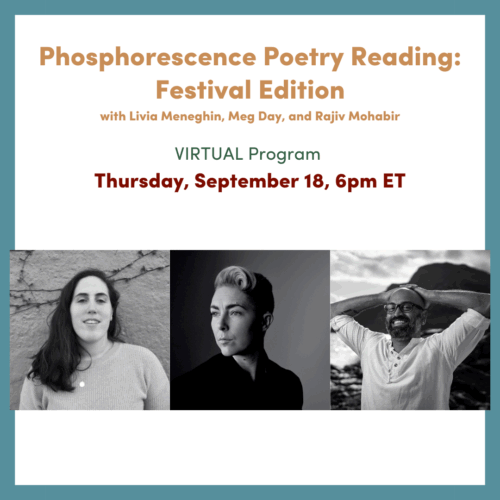
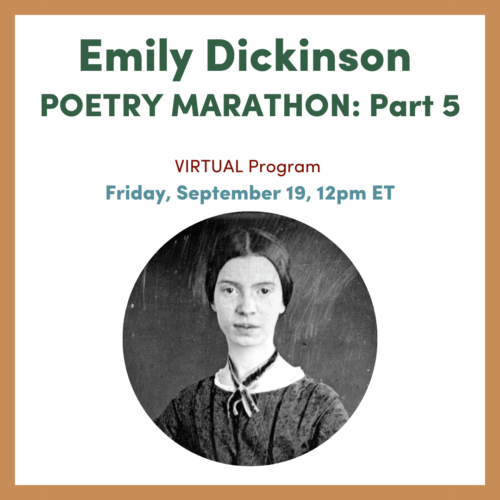
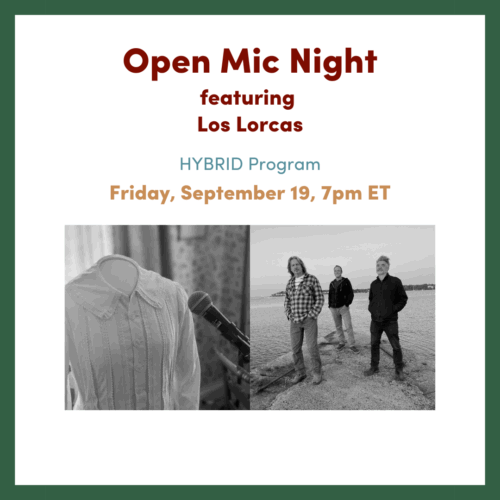
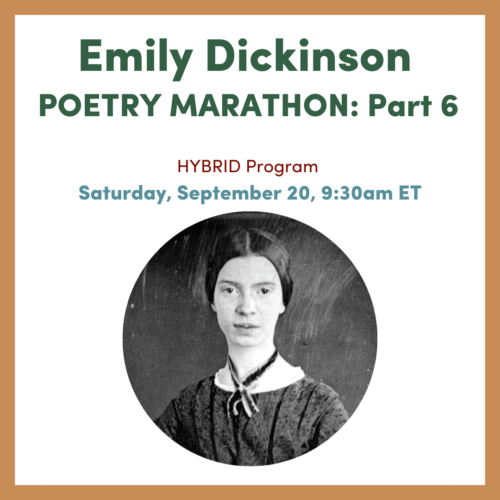
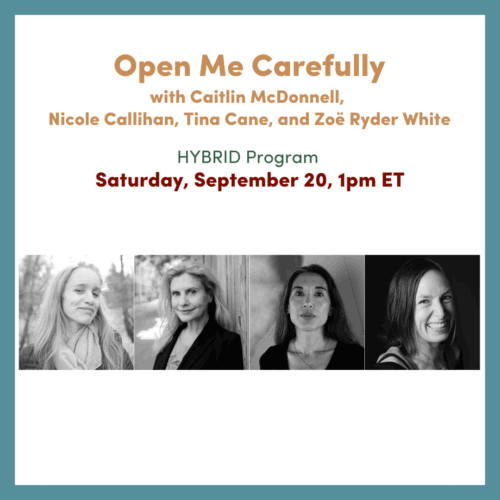
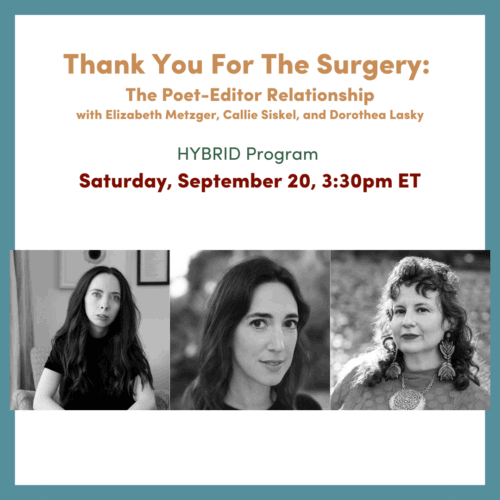
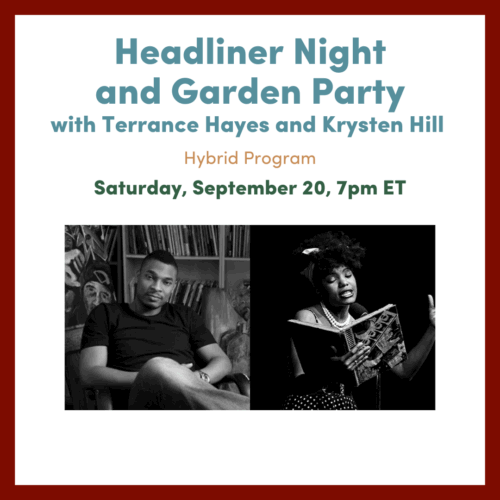
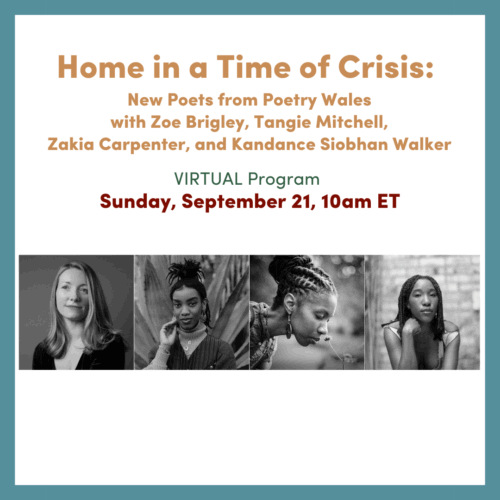
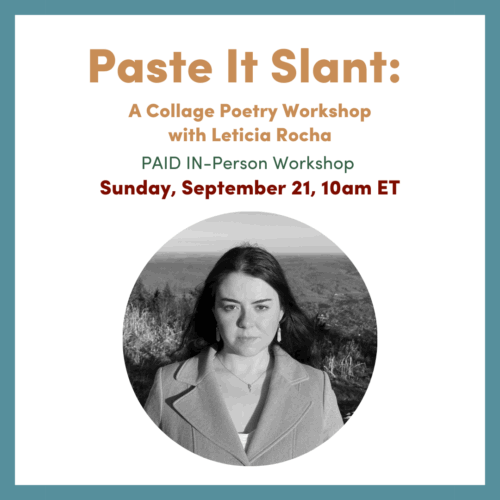
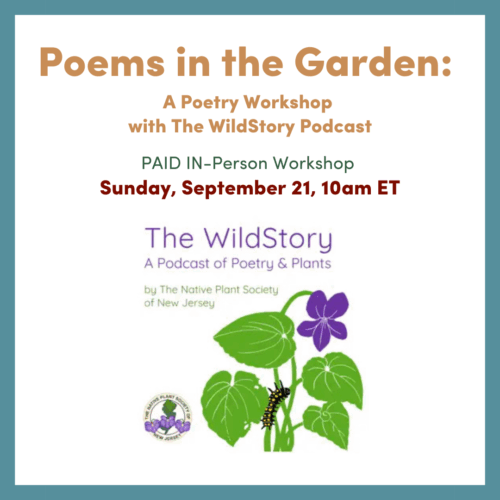
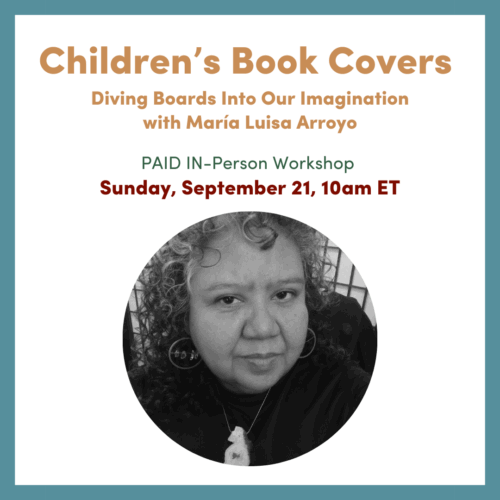
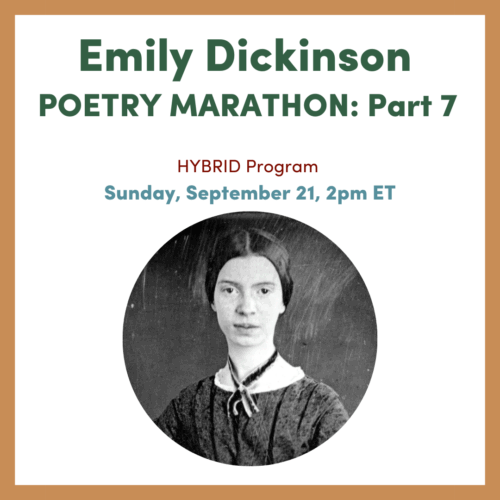
REGISTRATION TBA
Monday, September 15:
6-8:30pm [Virtual Program] — Emily Dickinson Poetry Marathon: Part 1
A group reading of all 1,789 poems by Emily Dickinson over the course of 7 sessions. This session takes place entirely virtually and is open to both readers and listeners. We will be reading from Ralph Franklin’s The Poems of Emily Dickinson: Reading Edition. Sign up as a listener by registering for the Festival, or learn more about signing up as a reader!
Tuesday, September 16:
12-2:15pm [Virtual Program] — Emily Dickinson Poetry Marathon: Part 2
A group reading of all 1,789 poems by Emily Dickinson over the course of 7 sessions. This session takes place entirely virtually and is open to both readers and listeners. We will be reading from Ralph Franklin’s The Poems of Emily Dickinson: Reading Edition. Sign up as a listener by registering for the Festival, or learn more about signing up as a reader!
3:30-5pm [Virtual Workshop] — The Beauty of Objectivity
This workshop provides beginning poets with a framework for analyzing poetry with an objective approach centered on craft elements. Participants will analyze Dickinson’s poems and contemporary examples, and they will generate and analyze their own poetry in response to Dickinson-centered prompts.
Featuring Mary Robles and Lucas Clark.
6:30-8pm [Virtual Workshop] — Putting the Wit in Witness: Bringing Levity to Heavy Topics
In this generative workshop, we turn to Dickinson and other contemporary poets who use a light hand to address tough subjects. Through readings and interactive writing exercises, participants will explore the power of this approach to inspire their own writing.
Featuring Amie Whittemore and Jung Hae Chae.
Wednesday, September 17:
12-2:15pm [Virtual Program] — Emily Dickinson Poetry Marathon: Part 3
A group reading of all 1,789 poems by Emily Dickinson over the course of 7 sessions. This session takes place entirely virtually and is open to both readers and listeners. We will be reading from Ralph Franklin’s The Poems of Emily Dickinson: Reading Edition. Sign up as a listener by registering for the Festival, or learn more about signing up as a reader!
2:30-4pm [Virtual Workshop] — Letters to the World: Epistolary Creativity Workshop
In this gentle and good-humored generative writing program, participants will play with letter-writing as a form of poetic and personal expression while drawing inspiration from Dickinson’s own letters. Guided freewriting sessions will be followed by opportunities for sharing and reflection. No experience necessary.
Featuring Sylvie Cathrall.
4:30-6pm [Virtual Panel] — We Are Not Where We Are
What do acts of erasure afford a writer? In this interactive workshop, we’ll be looking closely at resonant models of erasure (including Nicole Sealey, Sarah Sloat, Tracy K. Smith, and Jennifer Sperry Steinorth), and exploring the effects of different blackout poetry strategies.
Featuring Matt Donovan and Jenny George.
7:30-9pm [Virtual Workshop] — The Interior and the Other: on poetic and psychic transformation
What can poetry teach us about psychoanalysis, and the process of sharing one’s inner self with another? What can therapeutic or healing work teach us about writing poems? In this panel, two poets who have written about and undergone forms of therapy will explore the art and practice of writing about interiority and healing.
Featuring Ayelet Amittay and Dana Levin.
Thursday, September 18:
12-2:15pm [Virtual Program] — Emily Dickinson Poetry Marathon: Part 4
A group reading of all 1,789 poems by Emily Dickinson over the course of 7 sessions. This session takes place entirely virtually and is open to both readers and listeners. We will be reading from Ralph Franklin’s The Poems of Emily Dickinson: Reading Edition. Sign up as a listener by registering for the Festival, or learn more about signing up as a reader!
3-4:30pm [Virtual Workshop] — Food & Free Verse: A Celebration of Food Through Poetry
Meditate on different ways to perceive the way food nourishes the soul, just like a poem does: through memory and survival, through gratitude, through synaesthesia, through love languages and through socio-economic commentary. This is a unique poetry generative writing workshop for writers of all levels.
Featuring Ayelet Amittay and Dana Levin.
6-7:15pm [Virtual Reading] — Phosphorescence Contemporary Poetry Reading
Festival edition of the Museum’s monthly poetry reading series. Hear from poets around the world as they read their work and discuss what poetry and Dickinson mean to them.
Featuring Livia Meneghin, Meg Day, and Rajiv Mohabir.
Friday, September 19:
12-2:15pm [Virtual] — Emily Dickinson Poetry Marathon: Part 5
A group reading of all 1,789 poems by Emily Dickinson over the course of 7 sessions. This session takes place entirely virtually and is open to both readers and listeners. We will be reading from Ralph Franklin’s The Poems of Emily Dickinson: Reading Edition. Sign up as a listener by registering for the Festival, or learn more about signing up as a reader!
7-8:30pm [Hybrid Reading] — Open Mic Night
Bring your poems to Emily Dickinson’s garden! Readers will have 4 minutes each to make us feel “physically as if the top of [our] head[s] were taken off!” (Emily Dickinson to Thomas Wentworth Higginson, 16 August 1870). Las Lorcas will perform after the Open Mic. Open mic sign-ups will be handled in advance via a Google Form, and selected readers will be notified.
Saturday, September 20:
9:30am-12pm[Hybrid] — Emily Dickinson Poetry Marathon: Part 6
A group reading of all 1,789 poems by Emily Dickinson over the course of 7 sessions. For this session, readers must be present on-site, but listeners are welcome both in-person and online. We will be reading from Ralph Franklin’s The Poems of Emily Dickinson: Reading Edition. Gingerbread cookies inspired by Dickinson’s own recipe will be served. Sign up as a listener by registering for the Festival, or learn more about signing up as a reader!
1-2:30pm [In-Person Workshop] — Open Me Carefully
Emily Dickinson is known to have written more than a thousand intimate and poetic letters in her lifetime. In this workshop, poets will discuss the necessity and ascendancy of correspondence in their own lives and work. Panelists will consider poetry’s deep intersection of private world and public sphere, and then ask participants to do the same as they pen their own letter-poems.
Featuring Caitlin McDonnell, Nicole Callihan, Tina Cane, and Zoë Ryder White.
3:30-5pm [In-Person Panel] — Thank You For The Surgery: The Poet-Editor Relationship
In a poetry world in which many editors are poets themselves, and a main avenue for becoming a poet is the workshop classroom, how might the editor-poet relationship create a correspondence that is at once formative, supportive, and expansive, and a relationship that is personally and professionally meaningful and ideally non-hierarchical?
Featuring Elizabeth Metzger, Callie Siskel, and Dorothea Lasky.
7-9pm [Hybrid Reading] — Headliner Night and Garden Party with Terrance Hayes and Krysten Hill
Join us in Emily Dickinson’s garden or virtually for a celebration of creativity and poetry! Our headlining poet, Terrance Hayes, will read from his work and discuss poetic practice and inspiration.
Sunday, September 21:
10-11:30am [Virtual Panel] — Home in a Time of Crisis: New Poets from Poetry Wales
Where do we find home, belonging and comfort in a time of crisis? What might Emily Dickinson tell us about how to find comfort and strength when it sometimes feels like nothing we do can change things for the better?
Featuring Zoe Brigley, Tangie Mitchell, Zakia Carpenter, and Kandance Siobhan Walker.
10-11:30am [Paid In-Person Workshop] — Paste It Slant: A Collage Poetry Workshop
Join for a generative workshop that pairs the visual art form of collage with poetry! Participants will be guided through a process of discovery with different collaging materials and text to create their own hand-crafted collage. All levels of experience with poetry and visual art are welcome.
Featuring Leticia Rocha.
10-11:30am [Paid In-Person Workshop] — Poems in the Garden: A Poetry Workshop with The WildStory Podcast
In this generative workshop led by The WildStory Podcast host Ann E. Wallace and featured guest Elizabeth Sylvia, poetry and nature enthusiasts of all ages and experience levels are invited to slow down and open their senses to the natural world—the memories it holds, the meanings it carries, and the feelings it inspires. Participants will engage in writing exercises, learn new strategies, and compose a poem draft during the session.
Featuring Ann Wallace and Elizabeth Sylvia.
10-11:30am [Paid In-Person Workshop] — Children’s Book Covers: Diving Boards Into Our Imagination
Beginner and experienced poets of all ages are invited to come and use children’s book covers as diving boards into memory and imagination. Children’s books will be on hand to browse, and participants will also be encouraged to search online for their own current or past favorite children’s books. Using one or more of the five senses (sight, sound, touch, smell & taste), participants will generate drafts of new poems as the vivid literary landscape of rhymes, illustration, and stories of childhood spark memories and new ideas.
Featuring María Luisa Arroyo.
12:30-2:30pm [Hybrid] — Emily Dickinson Poetry Marathon: Grand Finale
A group reading of all 1,789 poems by Emily Dickinson over the course of 7 sessions. For this session, readers must be present on-site, but listeners are welcome both in-person and online. We will read from Ralph Franklin’s The Poems of Emily Dickinson: Reading Edition. Stay to the end to enjoy a celebratory slice of coconut cake inspired by Dickinson’s own recipe. Sign up as a listener by registering for the Festival, or learn more about signing up as a reader!
REGISTRATION TBA
About the Festival:
The Emily Dickinson Museum’s Annual Tell It Slant Poetry Festival is an event with international reach that celebrates Emily Dickinson’s poetic legacy and the contemporary creativity she and her work continues to inspire from the place she called home.
The Festival is named for Dickinson’s poem, “Tell all the truth but tell it slant,” underscoring the revolutionary power of poetry to shift our perspective and reveal new truths. Festival organizers are committed to featuring established and emerging poets who represent the diversity of the contemporary poetry landscape and to fostering community by placing poetry in the public sphere.
This year’s line-up features workshops, panels, and readings, by a diverse and talented group of poets from around the world. The cornerstone of the Festival, the Emily Dickinson Poetry Marathon, is an epic reading of all 1,789 of Emily Dickinson’s poems.
To follow along with the Emily Dickinson Poetry Marathon, get your copy of the Franklin edition from the Emily Dickinson Museum Shop.
The annual event attracts a diverse audience of Dickinson fans and poetry lovers, including students, educators, aspiring writers, and those who are new to poetry and literary events. Past Festival headliners have included Carl Phillips, Marilyn Nelson, Abigail Chabitnoy, Tracy K. Smith, Tiana Clark, Tess Taylor, Ada Limón, Jericho Brown, Franny Choi, Aimee Nezhukumatathil, Paisley Rekdal, Adrian Matejka, Kaveh Akbar, and Ocean Vuong.
Support The Tell It Slant Poetry Festival:
Admission to all Poetry Festival events is free–made possible by contributions from Museum supporters.
Please consider making a donation of any size during the registration process or anytime on the Museum’s website.
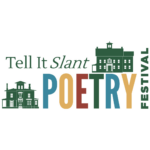
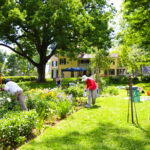
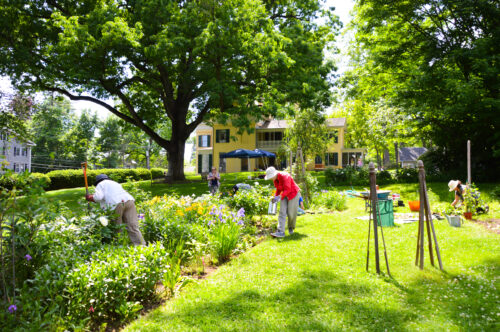
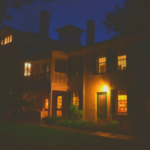
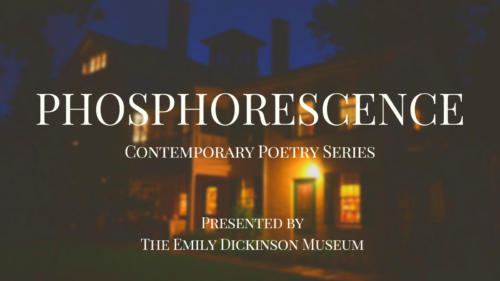
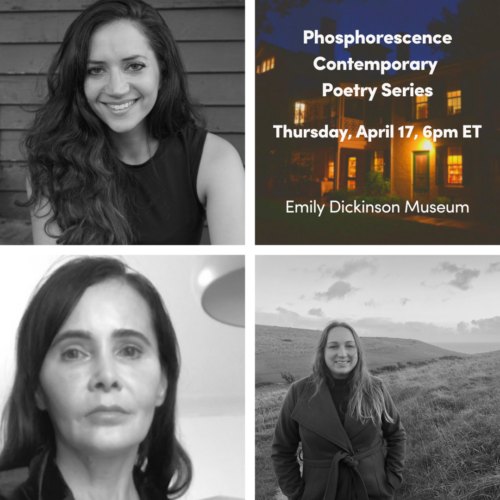 Thursday, April 17, 6pm ET
Thursday, April 17, 6pm ET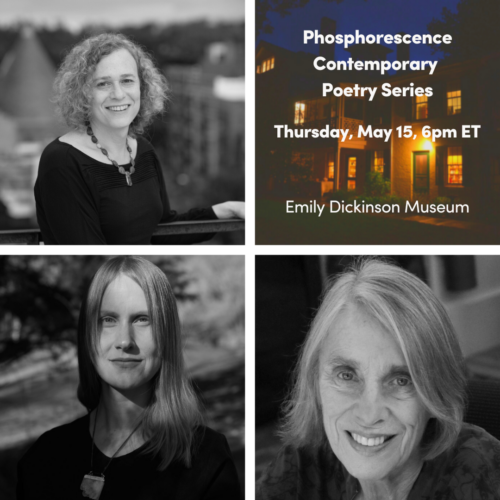 Thursday, May 15, 6pm ET
Thursday, May 15, 6pm ET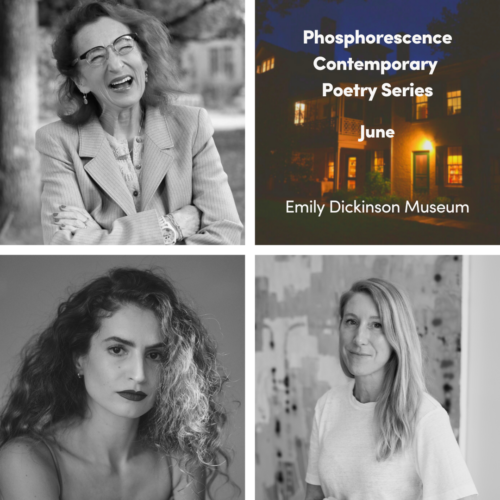
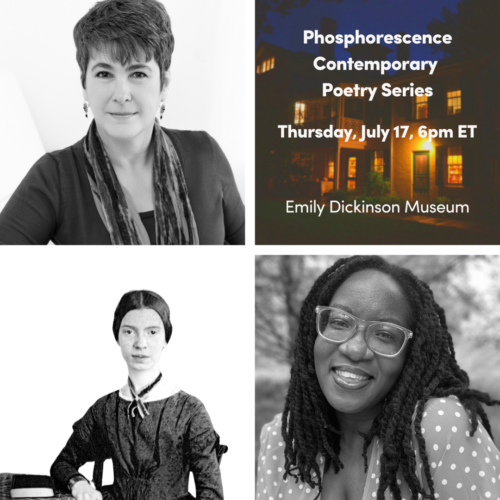 Thursday, July 17, 6pm ET
Thursday, July 17, 6pm ET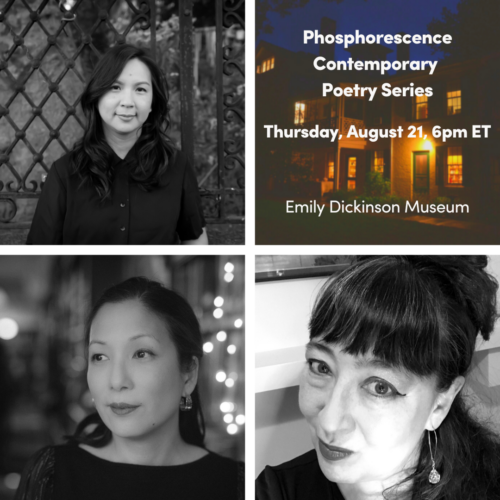 Thursday, August 21, 6pm ET
Thursday, August 21, 6pm ET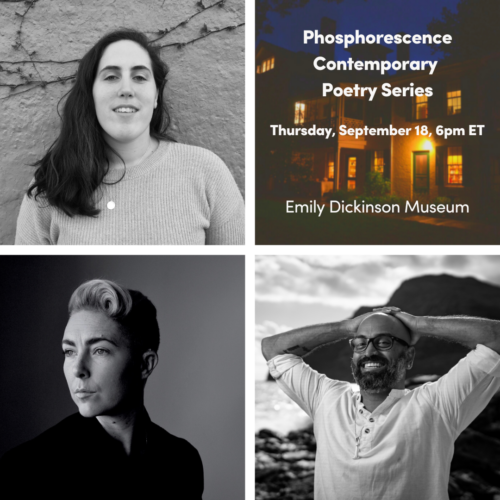 Thursday, September 18, 6pm ET
Thursday, September 18, 6pm ET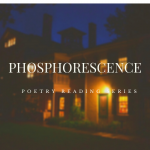
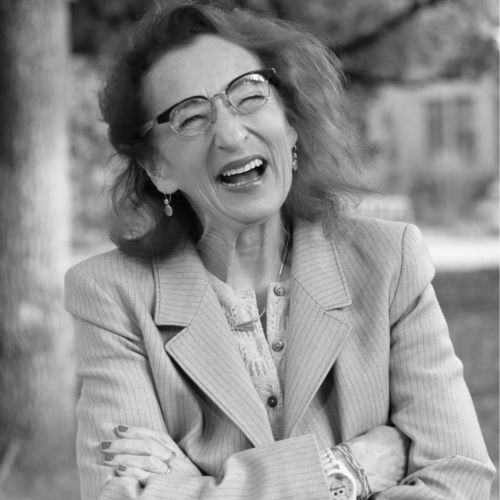
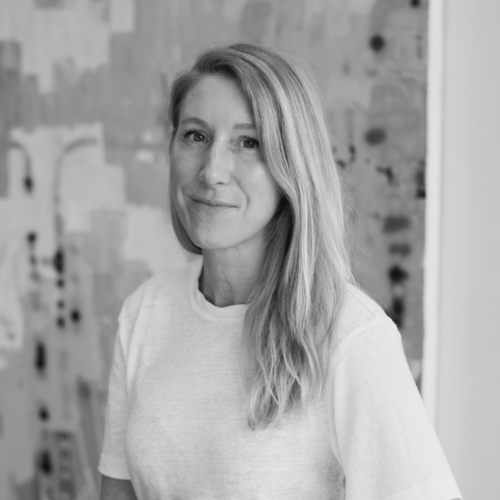
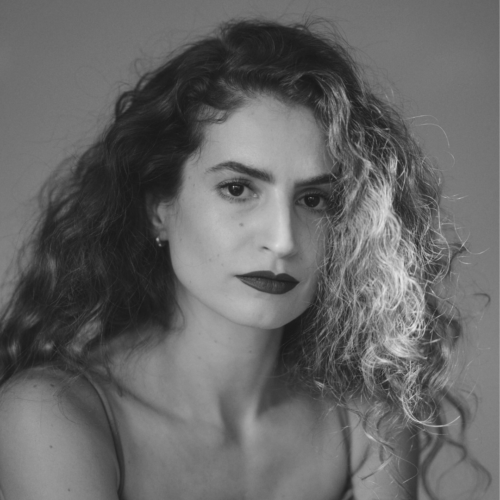 Rachelle Toarmino is a poet from Niagara Falls, New York. She is the author of the poetry collections Hell Yeah (Third Man Books, 2025) and That Ex (Big Lucks Books, 2020), as well as several chapbooks, most recently My Science (Sixth Finch Books, 2025), winner of the 2024 Sixth Finch Chapbook Contest. Her work has appeared in Poets.org, Literary Hub, Electric Literature, American Poetry Review, Bennington Review, Southeast Review, The Slowdown, and Omnidawn, which awarded her its 2024 Single Poem Broadside Prize. She earned her MFA in poetry at UMass Amherst, where she received an Academy of American Poets Prize. She is also the founding editor-in-chief of the literary publishing project Peach Mag and the creator and lead instructor of Beauty School, an independent poetry school. She lives in Buffalo.
Rachelle Toarmino is a poet from Niagara Falls, New York. She is the author of the poetry collections Hell Yeah (Third Man Books, 2025) and That Ex (Big Lucks Books, 2020), as well as several chapbooks, most recently My Science (Sixth Finch Books, 2025), winner of the 2024 Sixth Finch Chapbook Contest. Her work has appeared in Poets.org, Literary Hub, Electric Literature, American Poetry Review, Bennington Review, Southeast Review, The Slowdown, and Omnidawn, which awarded her its 2024 Single Poem Broadside Prize. She earned her MFA in poetry at UMass Amherst, where she received an Academy of American Poets Prize. She is also the founding editor-in-chief of the literary publishing project Peach Mag and the creator and lead instructor of Beauty School, an independent poetry school. She lives in Buffalo.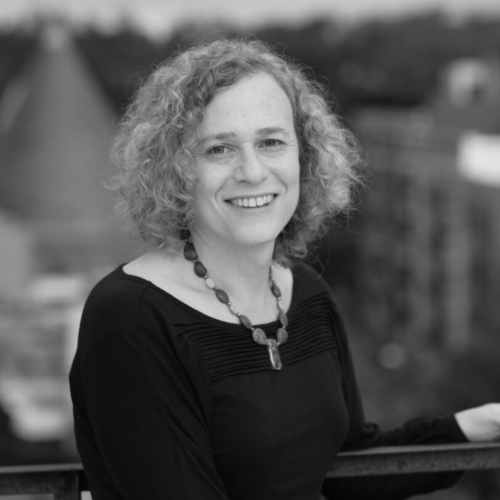
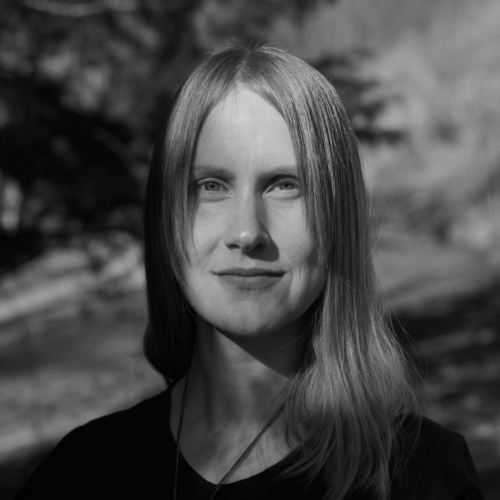 Niina Pollari is a poet and Finnish translator. She is the author of the poetry collections Path of Totality (Soft Skull 2022) and Dead Horse (Birds, LLC 2015), as well as the co-author of the split chapbook Total Mood Killer (Tiger Bee Press 2017). She lives in Marshall, NC with her family.
Niina Pollari is a poet and Finnish translator. She is the author of the poetry collections Path of Totality (Soft Skull 2022) and Dead Horse (Birds, LLC 2015), as well as the co-author of the split chapbook Total Mood Killer (Tiger Bee Press 2017). She lives in Marshall, NC with her family. 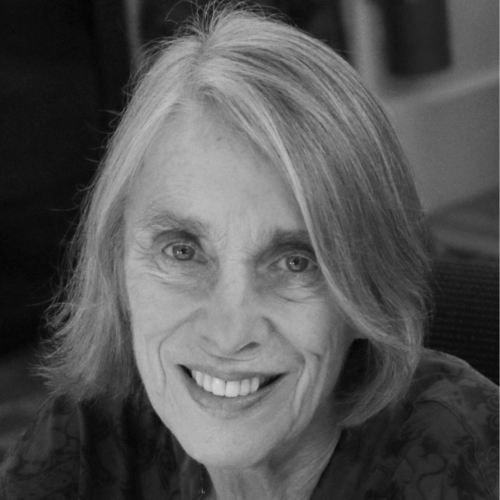 Joan Larkin‘s most recent book of poems is Old Stranger (Alice James Books, August 2024). She is the author of five previous collections of poetry, including Blue Hanuman (2014); My Body: New and Selected Poems (2007), which received the Audre Lorde Award from the Publishing Triangle; Lambda Literary Award winner Cold River (1997); and Housework (1975). With Jaime Manrique, Larkin translated Sor Juana’s Love Poems, a bilingual edition of Sor Juana Inez de la Cruz’s poetry (1997). Her prose works include If You Want What We Have: Sponsorship Meditations (1998) and Glad Day: Daily Meditations for Gay, Lesbian, Bisexual, and Transgender People (1998). Her plays include The AIDS Passion, The Living, and Wiretap. / Larkin co-founded Out & Out Books during the 1970s feminist literary explosion and has co-edited four anthologies, including Gay and Lesbian Poetry in Our Time. A lifelong teacher, she has served on the faculties of Brooklyn College, Sarah Lawrence College, and Smith College, among others. Larkin has been awarded fellowships from the National Endowment for the Arts, the New York Foundation for the Arts, the Academy of American Poets, and the Massachusetts Cultural Council. She received the 2011 Shelley Memorial Award from the Poetry Society of America.
Joan Larkin‘s most recent book of poems is Old Stranger (Alice James Books, August 2024). She is the author of five previous collections of poetry, including Blue Hanuman (2014); My Body: New and Selected Poems (2007), which received the Audre Lorde Award from the Publishing Triangle; Lambda Literary Award winner Cold River (1997); and Housework (1975). With Jaime Manrique, Larkin translated Sor Juana’s Love Poems, a bilingual edition of Sor Juana Inez de la Cruz’s poetry (1997). Her prose works include If You Want What We Have: Sponsorship Meditations (1998) and Glad Day: Daily Meditations for Gay, Lesbian, Bisexual, and Transgender People (1998). Her plays include The AIDS Passion, The Living, and Wiretap. / Larkin co-founded Out & Out Books during the 1970s feminist literary explosion and has co-edited four anthologies, including Gay and Lesbian Poetry in Our Time. A lifelong teacher, she has served on the faculties of Brooklyn College, Sarah Lawrence College, and Smith College, among others. Larkin has been awarded fellowships from the National Endowment for the Arts, the New York Foundation for the Arts, the Academy of American Poets, and the Massachusetts Cultural Council. She received the 2011 Shelley Memorial Award from the Poetry Society of America.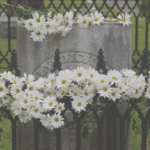
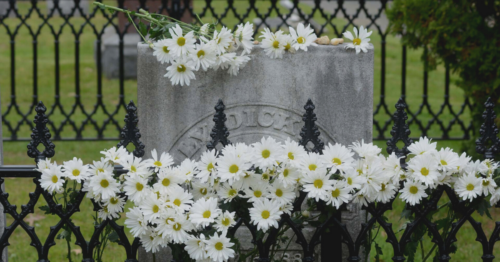
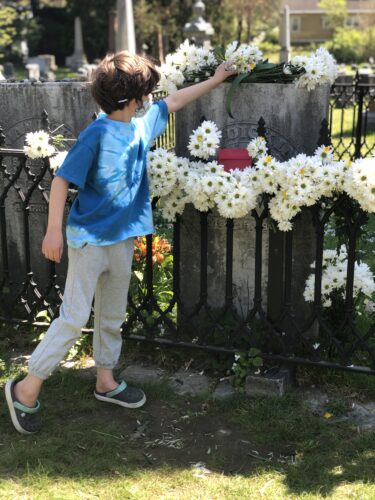 A Daisy for Dickinson:
A Daisy for Dickinson: 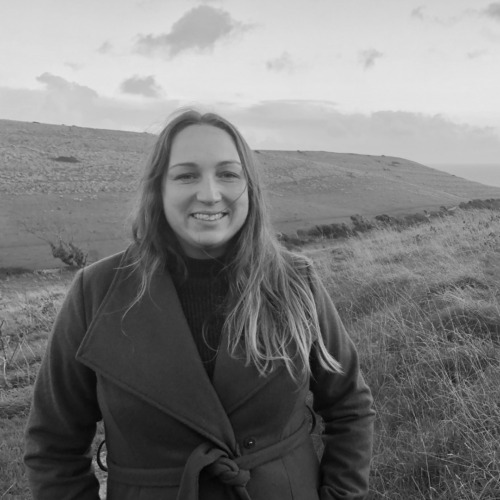
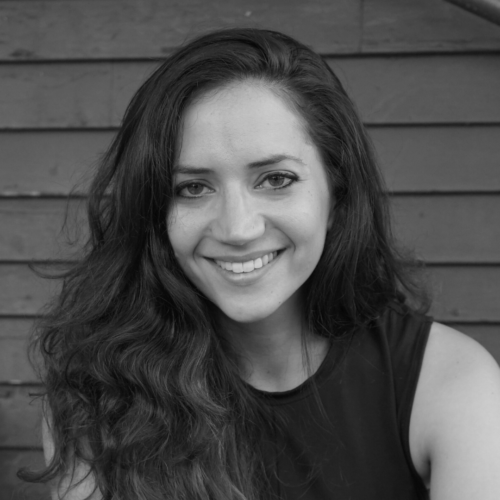 Avia Tadmor is the author of the poetry collection “Song in Tammuz,” winner of the Tupelo Press International Berkshire Prize, forthcoming 2026. Her poems appear or are forthcoming in Best New Poets, The New Republic, New England Review, Prairie Schooner, Iowa Review, and elsewhere. Avia’s poetry received support from Yaddo, the Rona Jaffe Foundation/ Bread Loaf Writers’ Workshop, the Vermont Studio Center, the Virginia Center for the Creative Arts, and the Adroit Journal’s Gregory Djanikian Scholars Program. Previously, she has taught writing at Columbia University, where she directed the Columbia Artist/Teachers program, promoting no-cost arts education in schools and community organizations in NYC. Currently, she is a Clinical Assistant Professor in the Expository Writing Program at New York University. Born in Jerusalem, she lives in New York.
Avia Tadmor is the author of the poetry collection “Song in Tammuz,” winner of the Tupelo Press International Berkshire Prize, forthcoming 2026. Her poems appear or are forthcoming in Best New Poets, The New Republic, New England Review, Prairie Schooner, Iowa Review, and elsewhere. Avia’s poetry received support from Yaddo, the Rona Jaffe Foundation/ Bread Loaf Writers’ Workshop, the Vermont Studio Center, the Virginia Center for the Creative Arts, and the Adroit Journal’s Gregory Djanikian Scholars Program. Previously, she has taught writing at Columbia University, where she directed the Columbia Artist/Teachers program, promoting no-cost arts education in schools and community organizations in NYC. Currently, she is a Clinical Assistant Professor in the Expository Writing Program at New York University. Born in Jerusalem, she lives in New York.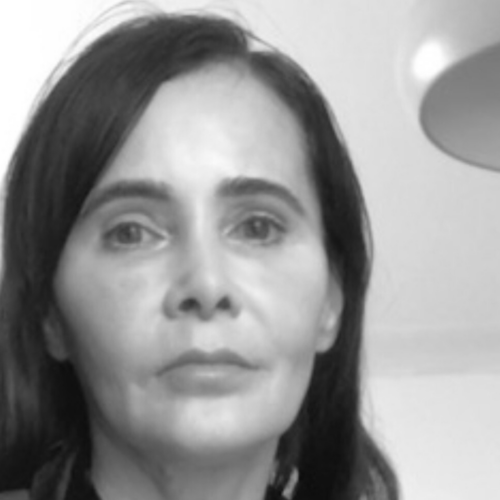 Silvia Bonilla was born and raised in South America. She received an MFA in Poetry from The New School. She is the author of a chapbook called “An Animal Startled by The Mechanisms of Life” (Deadly Chaps 2024) and “Town of Eves,” forthcoming from Arizona University Press. Her work has been featured in Blackbird, Green Mountains Review, Cream City Review, Reed, Cimarron Review, among others. She has received support from Kenyon Writers Workshop, The Staltonstall Foundation, Sewanee Writer’s Conference, Community of Writers, Napa Valley, The Frost Place, Colgate Writers Workshop and The Post Graduate Conference at The Vermont College of Fine Arts.
Silvia Bonilla was born and raised in South America. She received an MFA in Poetry from The New School. She is the author of a chapbook called “An Animal Startled by The Mechanisms of Life” (Deadly Chaps 2024) and “Town of Eves,” forthcoming from Arizona University Press. Her work has been featured in Blackbird, Green Mountains Review, Cream City Review, Reed, Cimarron Review, among others. She has received support from Kenyon Writers Workshop, The Staltonstall Foundation, Sewanee Writer’s Conference, Community of Writers, Napa Valley, The Frost Place, Colgate Writers Workshop and The Post Graduate Conference at The Vermont College of Fine Arts.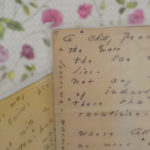
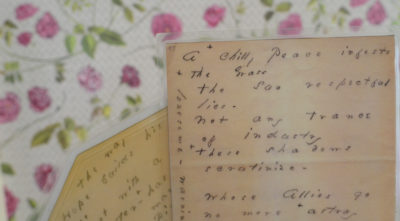 Join us for a lively virtual discussion of Emily Dickinson’s poetry and letters, meeting once a month from March to June. This program is designed to welcome newcomers and seasoned readers of Dickinson alike.
Join us for a lively virtual discussion of Emily Dickinson’s poetry and letters, meeting once a month from March to June. This program is designed to welcome newcomers and seasoned readers of Dickinson alike. 
